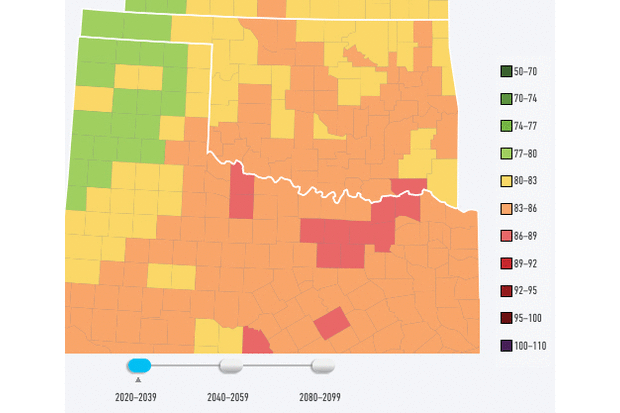Study: Climate Change Challenges Oklahoma’s Temperature-Sensitive Economy
-
Joe Wertz

Risky Business Project / Rhodium Group
Oklahoma's average summer temperature range is expected to increase from 81.7-83.58°F to 87.0-93.51°F from 2020 to 2099, the report predicts.
Future temperature changes pose serious risks to the climate-sensitive agricultural and energy industries in Oklahoma and other Great Plains states, a new study on the business and economic effects of climate change concludes.
Oklahoma, Kansas and Texas will likely experience an increase in extremely hot days, and a corresponding decrease in extremely cold days, in the decades to come, which could reduce crop yields, the “Risky Business” study concludes. The heat will likely raise demand for air conditioning and affect the efficiency and reliability of electricity production and transmission, burdening the power sector as it struggles to build new generators to keep up.
Constructing these new power-generation facilities will, in turn, raise residential and commercial energy prices. Our research concludes that climate-driven changes in heating and cooling will likely increase annual residential and commercial energy costs nationally by $474 million to $12 billion over the next 5 to 25 years and $8.5 billion to $30 billion by the middle of the century.
All of this could have a significant impact on the economy of the Great Plains.
The study was prepared by a bipartisan group chaired by well-known retired business executives and public officials: former New York Mayor Michael Bloomberg, former U.S. Secretary of the Treasury Henry Paulson and Thomas Steyer, a prominent retired hedge fund manager, and researched by a cadre of university academics.
Many of the report’s conclusions echo those presented the National Climate Assessment, released in May, which also contained a region-by-region risk assessment and predictions of increased energy and water demand, more extreme weather events, and changing crop cycles.
And, like the federal report before it, the “Risky Business” study concludes the best way for industry and business to guard against the economic threat posed by climate change is “adaption”:
In short, we have a choice whether we accept the climate risks laid out above or whether we get on another path. This is not a problem for another day. The investments we make today—this week, this month, this year—will determine our economic future.
